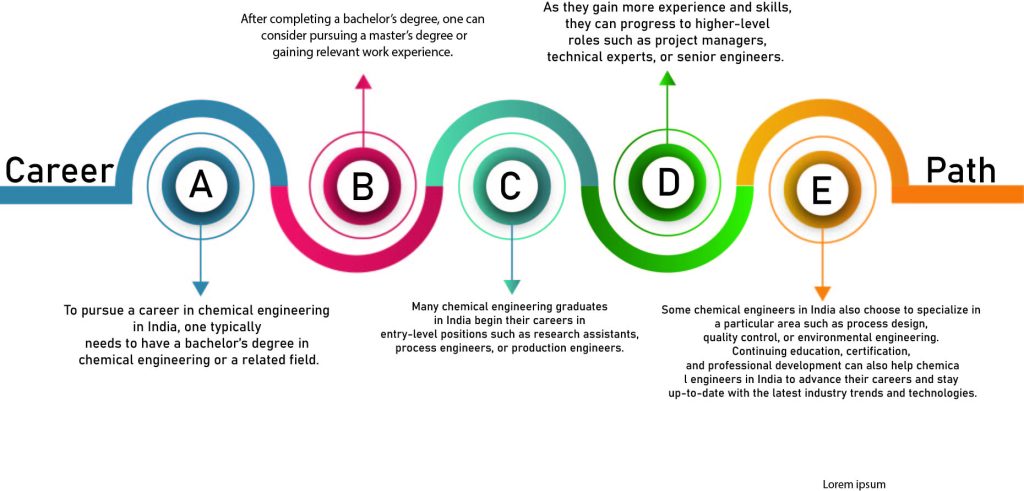Chemical engineering is a field of engineering that focuses on the design, development, and operation of processes and systems that transform raw materials into useful products. Chemical engineers use their knowledge of chemistry, physics, and mathematics to design and optimize processes for a variety of industries, including pharmaceuticals, energy, materials, food, and more. They are responsible for developing and improving processes to ensure safety, efficiency, and sustainability, as well as for troubleshooting and solving problems that arise during the production process. Chemical engineers play a critical role in developing new technologies and products that improve our lives and the world around us.

Work description
The work of a chemical engineer involves applying principles of chemistry, physics, and mathematics to design and optimize processes for the production of various products.
This includes researching and developing new processes, designing equipment and facilities, overseeing the installation and operation of equipment, and monitoring production processes to ensure they are safe, efficient, and sustainable.
Chemical engineers are also responsible for troubleshooting and solving problems that arise during production, as well as developing and implementing quality control procedures.
They work in a variety of industries, including pharmaceuticals, energy, materials, food, and more, and collaborate with other engineers, scientists, and technicians to achieve their goals.
High Demand
High demand for chemical engineers in various industries such as pharmaceuticals, energy, materials, and food.
Lucrative salaries
High earning potential with opportunities for advancement into management positions.
Opportunities for innovation
Ability to work on cutting-edge technology and contribute to the development of new products and processes.
Versatility
Wide range of career paths and opportunities for specialization.
Flexibility
Opportunity to work on projects that contribute to the greater good, such as developing sustainable and environmentally friendly technologies.
High stress
May require long hours and tight deadlines, especially during project implementation.
Long hours
May involve exposure to hazardous materials or working in hazardous environments, requiring strict adherence to safety procedures.
Competitive field
May require significant time and resources for continuing education to stay up-to-date with new technologies and industry trends.
Constant learning
Can involve working in remote locations or traveling frequently.
Isolation
May require collaboration with multiple teams and stakeholders, requiring strong communication and interpersonal skills.
The cost of pursuing a career in chemical engineering in India can vary depending on several factors such as the type of institution, the location, and the duration of the program.
On average, the total cost of a bachelor’s degree in chemical engineering can range from INR 4 to 10 lakhs, while a master’s degree can cost around INR 2 to 5 lakhs.
In addition to tuition fees, students may also need to consider expenses such as accommodation, textbooks, laboratory fees, and other related costs. Scholarships and financial aid are also available to eligible students, which can help to reduce the overall cost of pursuing a degree in chemical engineering.
[wpcharts type=”horizontalbarchart” bgcolor=”red:gray:yellow,blue:gray:yellow,random:gray:yellow,purple:gray:yellow” min=”0″ legend=”true” titles=”2 year , 5 year” values=”3,7,5,12″]
The earning potential of a chemical engineer in India can vary depending on several factors such as the level of education, experience, industry, and location.
On average, a chemical engineer in India can earn a starting salary of around INR 3 to 6 lakhs per year, while experienced professionals can earn up to INR 20 to 30 lakhs per year.
It is important to know that the salary of a chemical engineer can vary according to the location and institution they work for.
[wpcharts type=”horizontalbarchart” bgcolor=”red:gray:yellow,blue:gray:yellow,random:gray:yellow,purple:gray:yellow” min=”0″ legend=”false” titles=”Entry-Level, Mid-Career, Senior-Level ” values=”5,15,25,35,45,55″]
Strong background in mathematics, physics, and chemistry.
Analytical thinking and attention to detail.
Strong communication and interpersonal skills.
Attention to detail and ability to work with precision.
Ability to work independently or as part of a team.
Ability to handle and analyze complex data and information.
Willingness to continuously learn and adapt to new technologies and processes.
Poor mathematical or scientific background.
Lack of attention to detail or precision.
Poor time management and organizational skills.
Lack of willingness to continuously learn and adapt.
Poor communication and interpersonal skills.
Poor communication and interpersonal skills.
Lack of interest or passion for the field of chemical engineering.
Work-life balance
The work-life balance of a chemical engineer can vary depending on the industry, company, and job role. In general, chemical engineering can be a demanding field that requires attention to detail and a commitment to safety and quality. As a result, some chemical engineers may work long hours, especially in roles such as production, research, or project management. However, many companies in India also offer flexible work arrangements such as remote work or flexible schedules, which can help to improve work-life balance. Additionally, chemical engineers may also have opportunities for travel, professional development, and collaboration with colleagues from diverse backgrounds. With the right approach to time management, prioritization, and self-care, chemical engineers can achieve a healthy work-life balance and enjoy a fulfilling career in the field.

Chemical engineers play a key role in developing and improving products and processes that impact our daily lives, such as food, medicine, and energy.
Chemical engineering can contribute to sustainable development by developing eco-friendly processes and products, reducing waste, and improving energy efficiency.
Chemical engineers can help address environmental and social issues by developing and implementing solutions for clean water, air pollution, and climate change.
Chemical engineering can create job opportunities and contribute to economic growth in industries such as pharmaceuticals, petrochemicals, and renewable energy.
Chemical engineering can help to address societal challenges such as public health, safety, and security through the development of safe and reliable processes and products.
Process Engineering
designing and optimizing processes to produce chemicals, materials, or products efficiently and safely.
Biomolecular Engineering
Focuses on the design and manipulation of biological molecules, such as DNA, RNA, and proteins. Its applications include gene therapy, drug delivery, and biomaterials.
Materials Engineering
Concerned with the design and development of materials with specific properties like polymers, ceramics, and composites. Its applications include electronics, construction, and medical devices.
Molecular Engineering
Deals with the design and synthesis of molecules for specific applications. Its applications include drug development, energy storage, and nanotechnology.
Corrosion Engineering
Involves the study of corrosion and degradation of materials. It focuses on prevention and mitigation of corrosion in industrial settings. Its applications include oil and gas production, water treatment, and infrastructure.
Conclusion:
In conclusion, chemical engineering is a diverse and dynamic field that offers a wide range of career opportunities in India. With a strong foundation in mathematics, physics, and chemistry, a passion for problem-solving, and a commitment to safety and quality, individuals can pursue a rewarding career in chemical engineering. From developing eco-friendly products and processes to addressing environmental and social challenges, chemical engineers can make a significant impact on society while enjoying a fulfilling career. With the right skills, education, and experience, individuals can build a successful career in chemical engineering in India and contribute to the growth and development of the industry.



